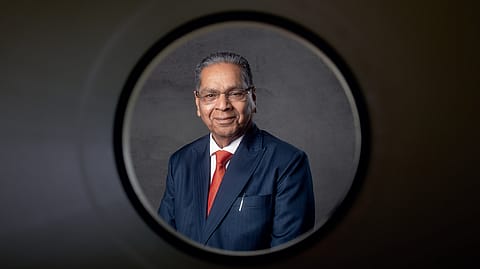Prince Pipes Taps Demand for Growth
Rising demand from housing and real estate on the back of enhanced production capacity and distribution network have added to the balance sheet of India's largest piping solutions company.

This story belongs to the Fortune India Magazine March 2023 issue.
WHEN MAHA KUMBH, the largest religious gathering in the country was held at Haridwar in April 2021, devotees at the five main ghats were greeted with an unusual gift — a miniature water tank to carry the holy water of Ganges to their homes. "It was part of the campaign 'Ab Ghar Ghar Mein Ganga' to brand our new water tank. We have had a plant in Haridwar since 2008 and were part of the local community which organised the Maha Kumbh," says Parag J. Chheda, joint managing director, Prince Pipes & Fittings.
The company is one of India's largest piping solutions and multi-polymer manufacturer with a portfolio of 7,200-plus stock-keeping units (SKUs) and over 15,000 distributors, pan India. The fourth largest in the solutions piping segment, Prince is promoted by Bollywood star Akshay Kumar, its brand ambassador for the past five years. Thanks to the growth in real estate and affordable housing in the country, coupled with government programmes like the ₹12,000 crore Swachh Bharat Mission to achieve universal sanitation, ₹76,000 crore Amrut Mission for providing basic civic amenities such as water supply and sewerage, and Smart City Mission, Prince Pipes is on a dream run since the past few years. Revenues increased to ₹2,657 crore in FY22 from ₹1,315 crore in FY18, while for the nine months ended FY23, it grew 11% to ₹1,946 crore from ₹1,756 crore a year ago. The company is profitable and debt-free, with ₹158 crore in cash and bank balance as of December 31, 2022.
"About 65% of our sales are from building solutions, 30% from agriculture and borewells and 2-3% from industry infrastructure solutions," says Jayant S. Chheda, chairman and managing director. Prince Pipes has seven manufacturing facilities across India, and a 7% market share in the 35 lakh tonne domestic pipe market worth ₹35,000 crore, which is growing at 7-8% per annum. Following the recently built 54,196 tonnes per annum (TPA) plant in Telangana, Prince Pipes' total capacity is currently 3.10 lakh tonnes, while capacity utilisation stands at 1.5 lakh tonnes. The additional capacity is anticipating future business, says Jayant Chheda.
"With healthy demand from the plumbing segment and rural demand expected to bounce back in the upcoming season, Prince Pipes' volumes should see a 12.5% compound annual growth rate (CAGR) over FY22 to FY24E," says Yes Securities analyst Udit Gajiwala. According to a recent HDFC Securities report, the company has a large product portfolio, robust pan-India distribution and low exposure (30-35%) to price-sensitive agri/rural markets.
"Government push on infrastructure along with strong demand from housing and real estate will be key demand drivers for the pipe industry in the medium to long term. Along with these demand tailwinds, Prince Pipes plans to increase its dealer network and introduce new products to outgrow the industry," says a recent report by ICICI Securities.
From a family of manufacturers of plastic kitchen wares, the Chhedas moved to make PVCs in 1987 and by 1994 had an annual turnover of ₹8 crore. Prince Pipes set up a large-scale plastic injection moulding and extrusion unit in Athal, Dadra and Nagar Haveli in 1995, and a new plant for pipe manufacturing at Dadra in 2000. In 2008, another unit was set up at Haridwar for manufacturing pipes and pipe fittings, the first in North India.
In 2012, the company acquired two plants of Trubore Piping System, a division of Chemplast Sanmar, in Chennai and Kolhapur, to augment capacity. In 2019, a new plant was set up in Jaipur for manufacturing pipes, and a year later, the company got listed. Prince Pipes also has a tie-up with Tooling Holland, a global leader in mould manufacturing, and with U.S.-based Lubrizol, the world's largest manufacturers of CPVC compounds (which can withstand high temperatures compared to PVCs).
More Stories from this Issue
"We are an integrated pipe manufacturer and see ourselves as a company that substitutes old technologies with newer polymer solutions," says Parag Chheda. He cites examples such as replacing GI (galvanised iron) pipes with PVCs, RCCs (reinforced concrete pipes) with DWCs (double wall corrugated pipes) in underground drainage solutions, which are more durable. The company is also an early mover in agri fittings & SWR (soil, waste and rainwater pipe) systems and a market leader in plumbing solutions.
It is currently expanding into new product verticals with the launch of a modern plumbing division, as part of its growth strategy to bring innovative, global products to the Indian market. It recently launched Skolan Safe, a premium polypropylene silent drainage system with German technology, and Prince Hauraton, a modern range of surface drainage solutions.
The industry has a huge growth potential as 75% of Indian households do not have drinking water on the premises and 85% do not have access to piped water. About 70% of the water is contaminated and 60 crore Indians face high to extreme stress over water, says Parag Chheda.
"The global average per capita consumption of PVC is 30 kg per annum, whereas in the U.S. it is 110 kg and in China about 50 kg. India has a long way to go as our consumption is only 12.5 kg per annum," he adds, noting that organised players, including Prince Pipes, have a long headroom ahead for growth.
(INR CR)